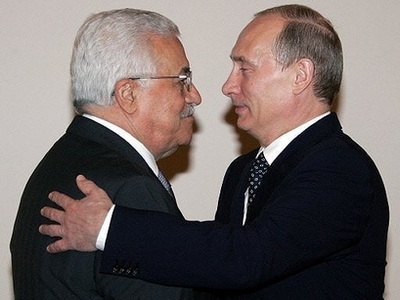
Russian President Vladimir Putin (R) welcomes Palestinian president Mahmud Abbas during their meeting at Novo-Ogaryovo residence outside Moscow. [Photo: AFP]
Russian President Vladimir Putin and his Palestinian counterpart Mahmoud Abbas met at his Novo- Ogaryovo residence on Friday evening, and the focus of their discussions indicated that Moscow will play a greater role in the Middle East peace process.
Firm support
The two leaders exchanged opinions of the development of the bilateral relations, the regional situation and the most important problem -- the Palestinian-Israeli settlement.
Moscow welcomes and supports Palestinian and Israeli settlement efforts, Putin said.
Describing the visit of Abbas to Russia at a tense moment, Putin said "the situation is difficult, but we can see that Israeli Prime Minister Ehud Olmert and you are working on positive trends." "We welcome that and will give you comprehensive support, " he added.
Russian Foreign Minister Sergei Lavrov, who welcomed the wish of Abbas to carry on the Palestinian-Israeli negotiations and achieve mutually acceptable peace agreements, held talks with the Palestinian president earlier in the day.
"The Russian side voiced firm support to the negotiations between the Palestinian National Authority (PNA) and Israel, which are aimed at the establishment of an independent and viable Palestinian state that would co-exist with Israel peacefully and securely," the Russian Foreign Ministry commented on Lavrov's meeting with Abbas.
Meanwhile, it is important for Palestine to restore unity on the basis acceptable to the international community, and all Palestinians should adhere to the Mecca accords and the Arab peace initiative, said the ministry.
Moscow conference
One of the top concerns that Abbas discussed with Putin was the plan for the Middle East peace conference in Moscow, which means Russia will play a greater role in the Middle East peace process.
With a hope for the success of the conference, Abbas said that the prospective forum might contribute to the success of the Middle East settlement process. The event, which is necessary for the boost of the negotiations started in Annapolis, is also supported energetically by Russia.
Putin first had the idea of holding a Moscow Middle East conference in 2005, and received the backing of several Arab countries last year. It was agreed after similar conferences in Annapolis and Paris that the next conference would take place in Moscow, Abbas said.
Both sides expressed their concerns over the remaining tensions in Gaza, and stressed the need for the fulfillment of the roadmap, the end of the Israeli settlement activities, acts of terrorism, as well as disproportionate use of force by Israel that causes sufferings and deaths of civilians.
The two sides agreed that the forum should include debates on the resumption of efforts on the Syrian and Lebanese tracks for the sake of the all-inclusive regional settlement.
(Xinhua News Agency April 19, 2008)